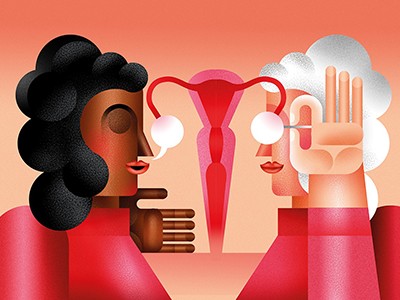
Menopause coincides with a time when people move into more senior roles.Credit: Luis Alvarez/Getty
Half of all the people on Earth will go through menopause. It is a natural part of ageing, affecting the majority of women, as well as some trans men and non-binary people. Levels of hormones including oestrogen, progesterone and testosterone decline, causing symptoms that can last a decade or more. Unfortunately, it is only in the past decade or so that its effects on women’s lives and careers have been the focus of more than a handful of studies.
Women don’t need telling that menopause symptoms, such as insomnia, fatigue and difficulty focusing, can have a major impact on their lives. Researchers are now discovering that such symptoms also disrupt a significant number of careers. In Japan last year, a study of thousands of people — the country’s first to focus on menopause and work — found that ‘menopausal loss’ affected one-fifth of women experiencing menopause, who quit, turned down promotions, reduced their working hours or were demoted as a result of their symptoms.
Menopause often comes at a time when people move into more senior, more demanding roles. In research, as in other careers, this coincidence is almost certainly causing some to reconsider their career ambitions, adding yet another drain to the ‘leaky pipeline’ of women in science. Women going through this stage of life shouldn’t have to row back or leave careers because of a lack of support from employers, as we report in a Careers Feature. Everyone must make their own choices, but no one should feel forced into any decision because of an unwelcoming workplace.
Why menopause matters in the academic workplace
There are many ways in which research workplaces can support staff going through menopause, as the authors of an essay last month in BDJ Team suggest (J. A. Bell et al. BDJ Team 9, 24–26; 2022). Offering flexible working hours and accepting menopause symptoms as a valid reason to take sick leave are good places to start. Some workplaces are also creating quiet spaces for staff; this not only helps those experiencing noise sensitivity, hot flushes and other symptoms of menopause, but also benefits those seeking quiet time for other reasons.
In some countries, people have established peer networks — either in-person or virtual — to support women going through menopause. One example is Red Hot Mamas in Canada and the United States. Another is menopause ‘cafés’, which began in the United Kingdom and offer informal gatherings that anyone, regardless of sex or gender, can attend to learn about and discuss menopause over a bite to eat and a drink.
The Royal Society in London, the world’s oldest science academy, launched a menopause support group for staff last year and is drawing up guidelines to ensure that women know how to access support, such as adjustments to roles, working hours or technology. The University of Nottingham, which has campuses in the United Kingdom, China and Malaysia, also has guidelines to help managers support staff going through menopause. This could include offering flexible working hours or better ventilation — by providing desk fans, for example, or, better still, using innovative approaches to interior architecture and design.
It’s time to talk about the M word
Workplaces can also offer advice on how to manage symptoms or provide information on where to obtain such advice — although more research is needed in this area, too.
However, such support needs to be offered with care. If institutional policies and support programmes are drawn up without involving the individuals most affected, they risk making those they aim to support feel self-conscious and stigmatized. Several women contacted by Nature expressed concern that highlighting the challenges some women face during menopause could put academic employers off hiring older women. Those fears are understandable, and there should be some ground rules for the discussion. Institutions should never force anyone to disclose their menopause status, nor require them to engage in discussions of the topic if they prefer not to.
Doing nothing should never be an option. Many employers (including Springer Nature) are pledging workplace support for people experiencing menopause. These pledges include ensuring that they are listened to, should they approach their managers, and that practical support is available. But these are just first steps. There is more that all employers, including those in the scientific and research space, can do.
The research community also needs to devote more attention and resources to studying the impact of menopause on careers everywhere, not just in high-income countries. And those organizations that have not yet started to address the difficulties that menopause can pose for working life need to do so now. It’s time for the stigma around menopause to be lifted. Doing so will make research a better place to work for everyone.

 Why menopause matters in the academic workplace
Why menopause matters in the academic workplace
 It’s time to talk about the M word
It’s time to talk about the M word
 Inequality in medicine
Inequality in medicine
 It’s time to expand the definition of ‘women’s health’
It’s time to expand the definition of ‘women’s health’






